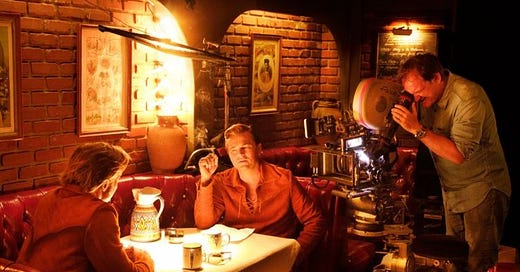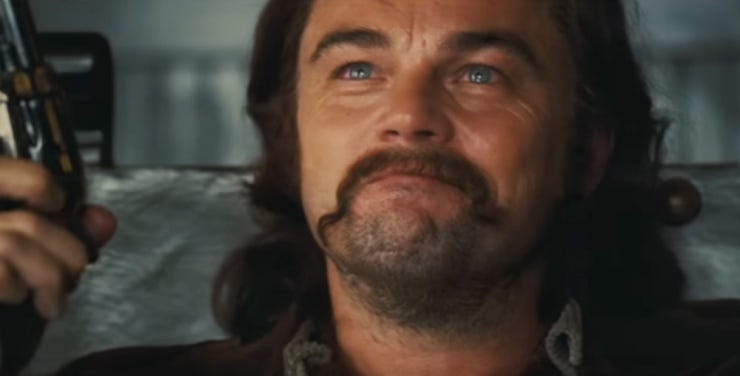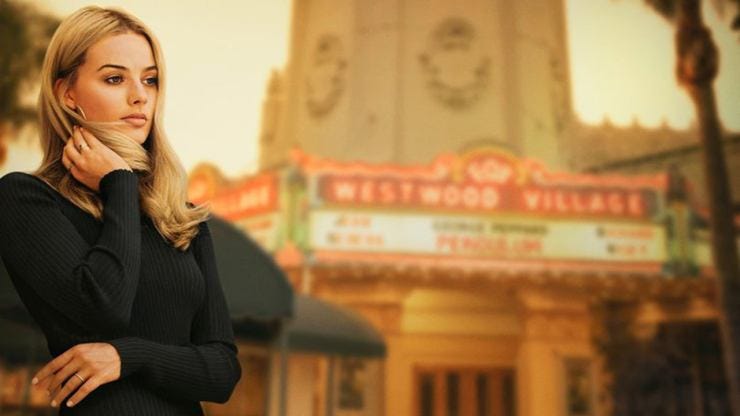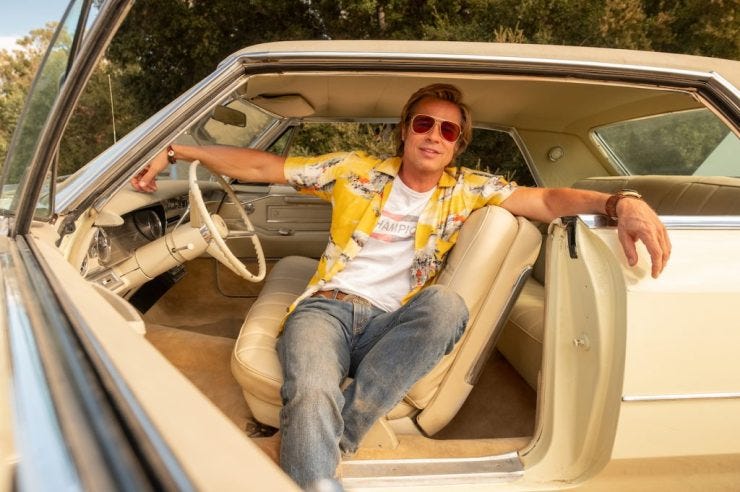WITH SPOILERS…
Watching the ninth movie by Quentin Tarantino glide by many things occurred to me. Not least, what a pleasure it is to be in Tarantino’s company once more. There are few nights out to compare. I’m of an age able to recall the press screening for Pulp Fiction, held in London on a hot summer night in 1994. We had heard all about Tarantino’s second film from its P’alme d’Or winning jaunt to the Riviera, but we weren’t ready. I’ve not been to another screening like it. Had the seats been wired to the mains in some crazy experiment? Critics were laughing, clapping, whooping in the effort to express the surge of shock and pleasure that ran through that cinema. As Travolta plunged that syringe, which looked long enough to impale a rhino, down toward poor, comatose Uma Thurman, her face smeared in heroin-snot, there were involuntary screams. We were captive to the sheer giddy rush of what movies might be able to do to us. We were high…
The first reaction to OUATIH (we’ll be here forever if I write it out in full each time) is how easy it is to watch. The film is two and half breezy hours, often slow in that moony, talky, ruminating Tarantino way; often nuts, and at one particular juncture extremely bloody, in that scandalous, PC-baiting Tarantino way. There’s not a dull note — you sit there marvelling how little you require the retina abuse of CG blizzards and hyperactive editing to stay in the room. You can just sit back and let it happen. There is no need to untangle the prior shenanigans of an extended universe. Plot, character, place and history are following their own rules. Tarantino calls it a “hang out movie” like Jackie Brown. The trajectories of each character and the film as a whole are ambling and easily side-tracked rather than predestined, the framework of the story is buried deep…
It is not a film that electrifies in the same way as Pulp Fiction, rigged to the snap of a punchline. A married, middle-aged, dare we say it, mature Tarantino is less showy (a relative distinction) than his youthful counterpart. He has a confidence to set aside (some of) the structural gamesmanship and let the story flow like a vodka cocktail scene to scene. An elegiac, chatty epic from an artist who claims to be drawing to a close…
This is a smooth ride through a City of Angels. And devils…
You’ll know the OUATIH rubric by now, this fine Hollywood bromance set against the shifting sands of the times: downwardly mobile TV star Rick Dalton (Leonardo DiCaprio) and compatriot Cliff Booth (Brad Pitt) try to figure out what comes next. Meanwhile, Sharon Tate (Margot Robbie) comes to town, her life a contented stream of parties and possibilities. And meanwhile, Charles Manson and his derelict Family of dropouts are pacing the fringes of the good life, looking for an opportunity…
The LA of 1969 is virtually Oz compared to the strip malls and sidewalks of Tarantino’s early films, which although contemporary leaned back into the beaten-up seventies that will follow OUATIH. So you can call it a prequel. Pulp Fact…
There is an aura of daydream about Tarantino’s return home, a fairy tale by designation, with all the klutzy glamour of the movie business and that God given sunshine. How did Guillermo del Toro put it? This feels like the memory of something that never happened. A state of yearning. The kind of off-kilter, high-end gossip characters in other Tarantino movies like to talk about…
Given it is the movie capital of the world, there are surprisingly few movies that capture the otherness of Los Angeles, where reality blurs into fiction. Among its many poses, OUATIH stands alongside The Big Sleep, Sunset Blvd, much of Point Blank, Chinatown, Blade Runner, Who Framed Roger Rabbit, Terminator 2: Judgment Day, Falling Down, Boyz N The Hood, Mulholland Dr., Pulp Fiction, LA Confidential, Magnolia, Heat and The Big Lebowski as great LA movies. LA movies that get LA right: that sleepy dazzle, the outside-inside life, the hills that poke up restlessly within the city bounds, the bungalow mansions that cling to their flanks, with their glacier-blue swimming pools steaming in the midnight air…
Longtime QT-DOP, the Cliff to his Rick if you want, Robert Richardson has surpassed himself. Licked by that vanilla light (a brand of unblemished brightness that provided an identical climate for a zillion TV Westerns and soap operas), the film luxuriates in the joys of tailgating through streets thronging with people and hope, the current of celebrity…
I’m not sure there is a better film in existence on the pleasures of roving the rainbow streets of LA in a Cadillac to the sound of The Mamas and The Papas or Neil Diamonds’s Kentucky Woman. Tarantino takes such delight in the movement of automobiles as streamlined as fish, the pure, foolish, dick-swinging exuberance of being behind the wheel…
Nevertheless, OUATIH is a thriller. It has a lot of plot, and plots lurking within the plot, all shaped with elegant purpose. But there is no requirement to get ahead of events. Not being able to figure out where we’re going (especially as on one level we think we know exactly where) is an almost vertiginous thrill in these days of movies written by predictive text. The Manson Family, the Spahn Ranch, the Tate murder, the crash landing of the sixties: history shimmies around Tarantino’s vibrant, flowing camera…
He may not be shuffling time and story like a poker deck, but Tarantino still plays some lovely, subtle sleight-of-hand between fact and fiction. Not only with the bigger historical picture, but in the way we sample long, involving scenes of the episodic television Rick Dalton stalks as a heavy before the camera pulls back to reveal the cameras on set, and all the tawdry behind the scenes routines within which he tries to maintain face. We have Rick digitally slotted into Tarantino’s childhood favourites like The FBI and The Untouchables. And scenes concocted from his made up ones like Bounty Law, former mainstay of Rick’s career, now cancelled, but enough to gauge its clunky appeal…
In a hopscotch of faked clips, trailers, flashbacks, cheesy ads, dumb promotional interviews and shows blaring out of nearby TV sets, Tarantino builds up a fictional inner-Daltonverse of brassy small screen pleasures and big screen B-pictures…
There will few incidental pleasures this year as delightful as Rick’s daydream of having beaten McQueen to The Great Escape or Al Pacino as smoothly vociferous agent Marvin Shwarz (make sure you get that right) enunciating the name “Sergio Corbucci” — second best director of Spaghetti Westerns and potential outlet for Rick’s devolving caché…
Indeed the shimmering ironies of Spaghetti Westerns remain the connective tissue that binds Tarantino’s galaxy together. The title is not just for show. We get plenty of Western action from Rick’s catalogue. More to the point, there are traces of the plot of Once Upon A Time in the West: two guys and a girl, the outside threat, the coming of a new era…
It is also a film about the fabric of stardom, both swish and tattered. Which was why it was so important to cast bona fide stars. We join a poolside party at the Playboy Mansion, nirvana’s hub, where Sharon Tate boogies without a care and Damien Lewis tries out Steve McQueen’s sour growl as he recounts the peculiar cohabitation situation at the Polanski’s house (Emile Hirsch appears as live-in ex Jay Sebring). We taste the high life, and its hangover in the fading decor of Rick’s place, not coincidentally right nextdoor on Cielo Drive…
And yet like all Tarantino movies, OUATIH still moves to the New Hollywood groove of the seventies. Which is another irony. This is film set on the cusp of that transitional phase when the old Hollywood, the Once Upon A Time… Hollywood, drained of purpose by the cheap hooks of television, gave way to a flurry of artistic brio in the early seventies. That was part of the motivation for 1969 and Manson, it marked the end of an era — the literal and figurative death of innocence…
Cliff, compared to Rick, is trailer trash. A real fringe player to the party scene. He’s installed his mobile shit-hole in the shadow of Van Nuys Drive-In, stalked by the movies even in his sleep, eating mac and cheese from the pan and feeding his red-brown pit bull Brandy a can or two of Wolf’s Teeth dog food — raccoon, bird, rat, or lizard flavours — a new edition to Tarantino’s stock of made-up brands. Pay attention: this will all prove relevant…
The detail is impeccable. Tarantino’s knowingness knows few bounds. There is a delectable in-joke wherein Sharon Tate visits a book store off the drag to buy a first edition of Tess of the d’Urbervilles for her husband (Polanski will get around to adapting it in ten years time — and caption it in memory of is wife, who had dreamed of playing Tess). This literary joint is the spitting image of the book store from noir classic The Big Sleep. In case you were missing the point, there is a replica Maltese Falcon by the till (or maybe it’s the real thing, who is to say?) from that other Bogart noir beauty. Said book store is also staffed by a relic played by the relic Clu Gulager, featured player in cult Daltonesque western shows of the sixties like Wanted Dead or Alive and Laramie…
Anyway, Rick…
I love that it is never entirely clear whether Rick has any real talent. He reminded me of the Coens’s Llewyn Davis, good enough to know he’s a failure (he’s Salieri too, but lacking a Mozart in his eye line, fixates on himself). It’s always a tricky business, an actor playing an actor. But get this: DiCaprio has the unenviable task of creating a loveable reality for this blowhard neurotic, addled on booze, smokes and the last embers of celebrity, marginally heightened to a Tarantino movie-movie tenor, and then portray Rick portraying his dumb characters with conviction, but also stiff enough at the edges to remind us he is no great shakes. In other words, he’s good bad in the scenes within the scenes. And at time, as he scuffs lines, he gets down to good bad bad. It’s a madcap challenge to which the star rises: all these different contours, hope, vanity, terror, comic effect, a sense of a decent professional losing his mind under the strain. Not least among the visions of madness is acting itself…
One thing is certain, Tarantino would be the first to cast Rick Dalton in his autumn years, igniting a brief revival as journalists clambered over each other to write about his overlooked greatness…
Tarantino is one of the few directors who openly admits to not only reading but embracing film criticism. Mark Harris’s Scenes from the Revolution — which compares and contrasts the five Best Picture nominees of 1968 — is a key text in understanding the backdrop to OUATIH. Tarantino has written extensively in the field himself — there’s a rumour that once he’s done with the 10th film by Quentin Tarantino, he’ll publish the collected works. Before then, we can look to his films as living works of criticism (Inglourious Basterds, of course, included a critic in its number: Michael Fassbender’s Lt. Archie Cox, author of Art Of The Eyes, The Heart, and The Mind: A Study of German Cinema in the Twenties, and Rick and Cliff have plenty of opinions to share on contemporary culture). OUATIH not only ponders Hollywood past, but queries Hollywood present. What do movies even do anymore…
Can we see a flicker of Tarantino’s own night sweats? In the film’s genes is a consideration of where he now stands in a modern multiverse so untethered from the past and all he holds dear. Tarantino, the firebrand of the early nineties, has been around long enough to have weathered into history. For the first time you feel him genuinely probing his own place in the world like a loose tooth. Is he still relevant? He could easily be Rick, rattling with distress…
We are challenged to compare Rick to Sharon Tate, brimming with life’s pleasures, light as a dove, skipping in to see herself on the big screen, and grin with goofy delight (just as we had upon first seeing Pulp Fiction) as the scattered audience light up at her antics in Matt Helm screwballer The Wrecking Crew. With nonchalant postmodernism, Tarantino plays the real Dean Martin flick on the screen, with the real Sharon Tate, and it fits. Things in movies are different to life…
Robbie’s Tate is deliberately angelic, an almost abstract innocence that floats across the film barely rubbing shoulders with the plot. There have been complaints from the justice police over Tarantino’s neglect of the character. You can certainly mount an argument that his structure and intention are not really very woke — Robbie’s part is inferior in range and dialogue to what is offered to DiCaprio and Pitt. Tarantino could have written a different film, told a different, more Tate-centric story. But within this variant on OUATIH, the depiction of Tate makes absolute sense, and the serenity and sweetness given to her by Robbie are something we rarely get to savour in a Tarantino joint…
Indeed, in a recent, illuminating on-stage Q&A with director bud Paul Thomas Anderson (essential OUATIH background to be found here: https://thefilmstage.com/news/listen-quentin-tarantino-and-paul-thomas-anderson-discuss-once-upon-a-time-in-hollywood/) made the case that Sharon Tate was not one of his characters. “Rick’s a Quentin Tarantino character,” he explained. “Cliff’s a Quentin Tarantino character. Even McQueen is a bit of Quentin Tarantino character. In a way, I didn’t want Sharon to be a character. I wanted her to be the person that she is.” So we’re just watching her as real life — as reimagined by Tarantino, having read the biographies, talked to her sister, getting as close as he could to what she may have been like. In more ways than one this is an act of resurrection…
It occurs to me now, twice upon a time… in Hollywood, that it is at heart a film about vanity as much as anything. Set in the most vain town of all, among the most vain of its citizens, striving in an industry run on vanity. Can we view Robbie’s Sharon Tate, pointing herself out to the box office clerk and getting a picture with the cinema manager, as both charming and, when it comes to it, vain? Was she really like that? Sensing envious eyes on her back? Rick is being consumed by his own vanity — it’s virtually an affliction. Cliff, so laidback and sure of himself, vainly puts a vainglorious Bruce Lee in his place (we’ll come to this). And in Tarantino’s view, the Manson Family, who have supposedly shed the plumage of the times for the unwashed truth, do nothing but rattle on about their own transcendent place in the universe. Manson, when it comes down to it, was an attention seeker…
Quite why Tate reveals grubby souls resting on the seat in front is another mystery of Tarantino’s peccadillo for lady feet (of which we get enough close ups to count as a motif). Or it might simply be recognition of how filthy cinema floors got in the sixties. Or maybe she is supposed to chime, softly, with the grubby state of the hippie-chicks of the Family, where innocence has soured…
There’s a passing gag about snoring beauties. This is still a fairy-tale…
It is telling that the potpourri of pop cultural ephemera has transferred from the flurries of dialogue into the background: in cinema fronts, restaurant signs, studio billboards and the mythic clutter of sound stages and backlots. Following on from The Hateful Eight (a better film than its current rep as low-wattage Tarantino maintains), the director has gone big on world building. Think Johnny Rockerfellas as a design ethos…
So overall, in a positive way, the film is far less quotable than any Tarantino before it. The script relocates somewhere closer to the rhythms of life. Not that it’s devoid of verbose riffs on Italian directors or acting technique, just this is… Hollywood. People tend to talk about themselves…
Newcomer points go to the memorable turns provided by Margaret Qualley as skinny Manson misfit Pussycat, trying her luck on Cliff, and Julia Butters as a precocious child star named Trudi who stirs Rick from his doldrums. That former precocious child star Dakota Fanning crops up, scuzzy and chillingly defiant as real-life Manson acolyte Squeaky Fromme, adds another dark irony to the mix…
The corruption of innocence is clearly on Tarantino’s mind…
What of Brad Pitt as Cliff, erstwhile stuntman, Dalton gofer, best friend on the payroll and suntanned fix-it guy? Well, you could say, it’s his movie. He’s the hero. A good soul in a sold out town. But he’s got his issues…
Cliff has a troubled past, which means no one in the stunt game (including Randy, played by big grinning Kurt Russell, a relative perchance to Stuntman Mike in Death Proof?) has got any time for him, as much as Rick begs on his behalf. Cliff’s dead-end career brings us back to Tarantino. As much as he’s Rick, he’s also Cliff — a man whose hopes have been derailed by a former misjudgment. After the whole Uma thing, connected tangentially with the whole Harvey thing, there was talk of Tarantino being cast out of Babylon, metaphorically left to fix aerials and reminisce about bettering Bruce Lee in a fight. Cliff’s redemption, if that’s what it is, is Quentin’s daydream…
That Bruce Lee scene is debatable in theory, but in practice very funny, not least because Korean actor Mike Moh gives such a winningly absurd performance as the fabled fighter. The point, to me, is that this is a fantasy Bruce Lee, in costume and channelling Kato in The Green Hornet (he could be made up in Cliff’s head). But you’re entitled to be offended if you want. We’re in Tarantinoland…
Anyway, Cliff…
The film’s best sequence takes Cliff, by chance (and momentarily following his pecker), to the Spahn Ranch on the wild hinterlands of LA, recreated in authentic detail for the occasion (what you might call ranch dressing). Cliff knows it from his stunting days on Rick’s Bounty Law. It’s now the scuzzy domain of the Manson Family, a cackle of unlovely hippies, whose reception is far from welcoming (NB: Manson like Polanski is merely a passing shadow in the story)…
Like a Southern Californian Midsommer, the gear shift into dread is seamless. A chill wind wafts through the glossy Hollywood posturing like the death rattle of the sixties. There is a whisper of Vietnam on the cold breeze, flower power wilting into dementia, murder most foul. Fame’s ugly opposite — notoriety…
In a sharp little cameo, Bruce Dern emerges from beneath crumpled sheets like a mole. He’s assaying another interloper from the real world — the Ranch’s blind old owner George Spahn, caught up in the thrall of the Family’s sexual dominion and the cause of Cliff’s immediate concern. Dern is fine, but it was a part readymade for Burt Reynolds, cast before passing away…
The Spahn Ranch sequence is almost a Sliding Doors invitation. Another film suggests itself, a horror movie pitched at icy realism. That is not Tarantino’s bag, but it would have been something to have him truly confront the despair of Manson’s stain…
Anyway, the actual non-actual ending…
As it is, exactly how OUATIH unravels its knot of life and art is very funny. But you’ll check yourself for laughing. The screams were back at the screening I was in — at the outrageousness of it all; Tarantino’s ability to entwine ultraviolence and deranged wit. It’s been a while since we’ve sampled such gurgling bad taste.
SO SPOILER ALERT! Okay, ready? Here we go… In a madcap reversal of fortune, Sharon Tate lives on. Just as Tarantino rid us of Hitler a little earlier than recorded history, he adjusts the horrors of Cielo Drive, sending Manson’s crazed hippy outliers nextdoor to Rick’s diminishing luxury, where they confront Cliff, tripping… And, going right back through True Romance, 12 Monkeys, Snatch, and Inglourious Basterds, Brad Pitt can trip the light fantastic. In fact, he is way more fun with craziness bubbling away beneath the grin, and Cliff tackles the intruders in a giggle of LSD induced mania. Brandy helps. As does a well aimed can of Wolf’s Tooth. And Rick, eventually…
There is an adjustment of tone too. The whole film starts tripping (can we conceive it as a drug-induced fever dream?). The violence is reckless and extreme. You’ll wince. Turn away. And the fact that most of it is meted out against women diverts us down a complicated ethical branch line: to beat one woman to death, then cook another with a flamethrower (the single male villain gets Brandy’s teeth attached to his unholy of unholies), in order to save another pregnant woman and reconfigure history. You might argue the Manson Family was dominated by women, they really did commit the awful deed, and this is Tarantino’s rampage of revenge. We should also mention the late and welcome arrival of Maya Hawke, daughter of Uma Thurman, that voice unmistakable like the ghost of movies past…
I’m not sure I found it as cathartic as others have, but I laughed. And I worried at my laughter. Which feels like an honest and fitting reaction. That willingness to bowl headlong into the pins of propriety — especially in this patrolled era — is a welcome rush of caffeine to our complacent cinema. Stories must challenge us…
Here too is a whisper of something deeper — a pondering of the purposes of fiction. Can we really use stories to mend sorry reality? What might be the world be like with Sharon Tate? Maybe the sixties would never have died, as Manson shrunk from view. Maybe the seventies would never have happened quite as they did. At the end of this new timeline, would we even get Quentin Tarantino, jiving his love for exploitation thrillers and Godard among the aisles of Video Archives, readying himself to reinvent movies…
OUATIH really is a gorgeous, crackpot, very moving hymn to cinema. Not film, cinema, in the get out there, off your ass and back into a movie house kind of way. Television is a cheap trick, a sideshow, an old hustle, don’t go falling for its mountebank wares. It is only in the high church of the movie theatre can the world be mended…
Quentin Tarantino The Iconic Filmmaker and His Work is out now







